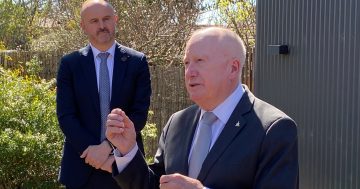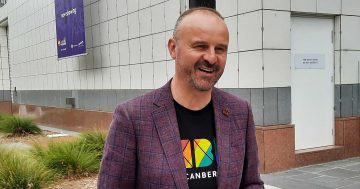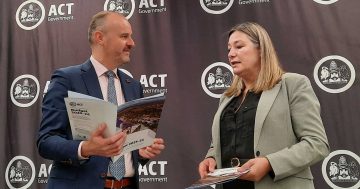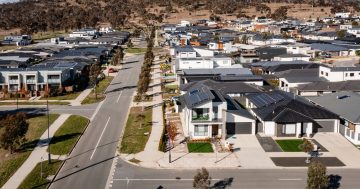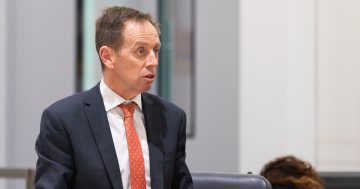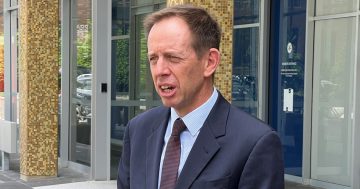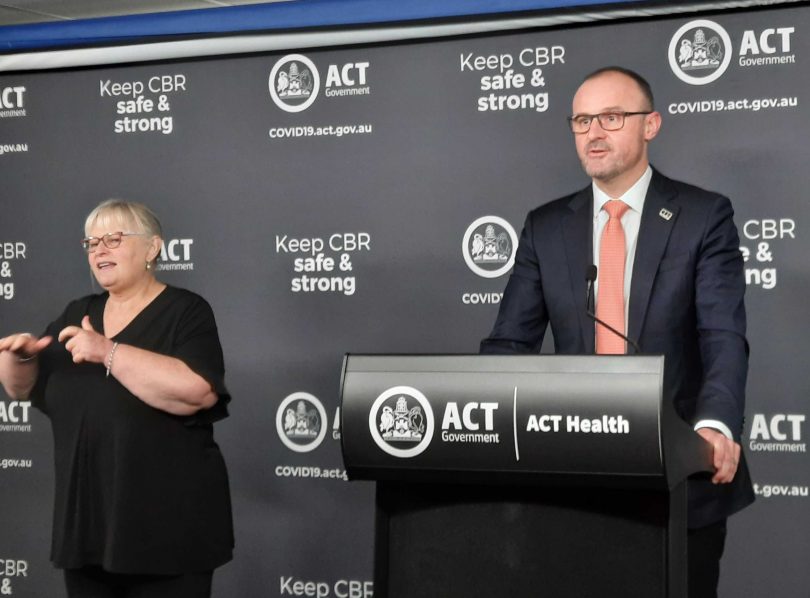
Chief Minister Andrew Barr delivering one of many COVID-19 briefings. Photo: Ian Bushnell.
When musing about what kind of year the ACT Government has had, the inescapable image is of Chief Minister Andrew Barr fronting the cameras for yet another COVID update, especially when announcing the ACT’s first lockdown death.
Mr Barr reinforced his reputation as a steady, measured and empathetic leader who, together with Chief Health Officer Dr Kerryn Coleman, did his best to protect Canberra from the virus and drive world-beating vaccination rates.
He weathered the daily grilling with patience and humour, giving lengthy answers, even if he often had to repeat himself as new reporters rotated through.
He was provoked to anger when the likes of Sky News dropped in to toss a few hand grenades at him, but the real chill would come when his answers shrank to an icy yes/no.
Across his brief and articulate, Mr Barr was able to hold his own at National Cabinet, advocate for Canberra and maintain the public health line amid the Commonwealth-Labor state warfare that would regularly break out.
He delivered two budgets designed to keep the Canberra economy ticking over and, importantly for his government, often maligned for not being able to deliver on big projects, signed off on the start of construction on the Canberra Hospital Expansion, the new Woden interchange and works to enable light rail Stage 2 to Commonwealth Park.
All three will play a vital role in the government’s re-election chances in 2024 against what is looking like a revitalised Canberra Liberals team, as will the new CIT in Woden, which many in the community believe is sited in the wrong place. Transport and City Services Minister Chris Steel shepherded the interchange and CIT through the community consultation and will now want to deliver.
He will also have a range of other infrastructure works across the city to bed down.
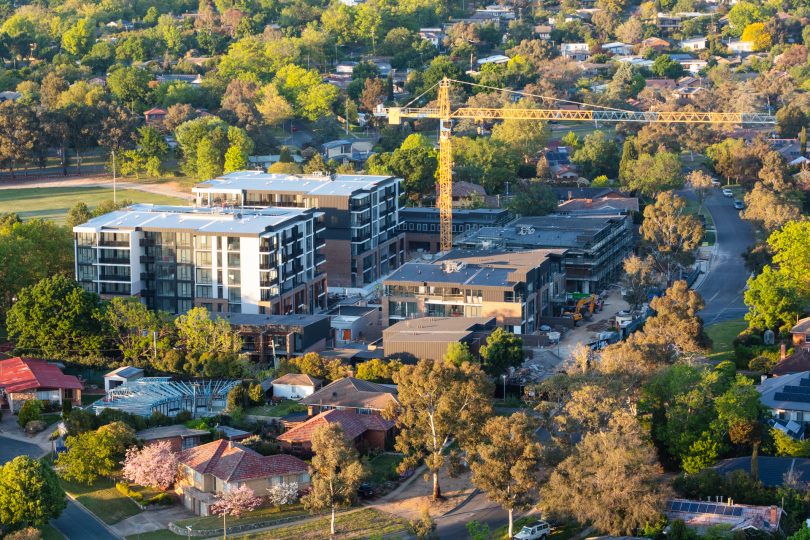
Housing, planning and infill development will be areas of vulnerability for the government. Photo: Thomas Lucraft.
Mr Barr’s other COVID partner, Rachel Stephen-Smith, will be the Health Minister who actually delivers the hospital upgrade.
The relentless COVID coverage has steeled her. According to most data, she is now the government’s best performer after Mr Barr, which is a good thing because the ACT’s hospital performance continues to be the worst in the country.
Despite runaway house prices, an insatiable demand for property and a rental market squeeze that is a barrier to new workers and a bane for the ACT’s low-income residents, Mr Barr and his ministers stayed the course with the government’s current policies.
The only concession, apart from COVID-related measures, was to explore ways to encourage build-to-rent options in the ACT.
Housing and planning will continue to be contentious for the government, with probably its weakest link, Mick Gentleman, in charge of fixing Canberra’s broken planning system and rolling out proposed legislative changes.
It will have to deal with a deep sense of distrust in the community about what kind of new planning system will emerge, although no one should think that there is a uniform view about the direction of development in Canberra.
The latest NAPLAN results also pose problems for the government, confirming a trend of sliding performance in public schools, something Education Minister Yvette Berry refuses to accept – at least publicly.
The Opposition actually produced a policy document on this that makes a lot of sense for parents wondering why their children are not achieving as they should.
Across these portfolio areas, the government will need to be on guard because the Liberals are lifting their game to offer sober criticism and real policy alternatives and will continue to probe away at housing, planning and development where they sense the government has lost its way and is out of touch with young families.
It can’t be forgotten that the Greens have three ministers in the government, and through the parliamentary agreement, have wielded considerable influence, particularly on climate change and environmental policy.
But they have also had to curb their ambitions and fall into line as part of being inside the tent.
The two new ministers – Rebecca Vassarotti and Emma Davidson – have had an understandably cautious start, but it has to be remembered that the way Mr Barr fashioned the ministry kept much of the real power in Labor hands.
Both of them will feel increased expectations from their constituency as pressures build around touchstone issues such as housing and welfare.
Greens leader Shane Rattenbury is another anchor for the government, although he must have been well pleased to offload the basket-case that is Corrections to Mr Gentleman.
Mr Rattenbury believes the increased Greens cohort has brought a greater collaborative approach to the Assembly, changing the equation for the better. His pragmatic manner is a template for successful socially progressive politicians.
The challenge for the Greens is how to differentiate themselves while in government, especially by year’s end when we move into the second half of the electoral cycle.
The New Year starts as did the old, under the shadow of COVID, only this time the expectation is with a close to fully vaccinated population and boosters, the government can hopefully avoid measures that will hurt a rebounding economy.
It will hope Omicron is indeed a variant with less of a punch and points to a waning virus.













